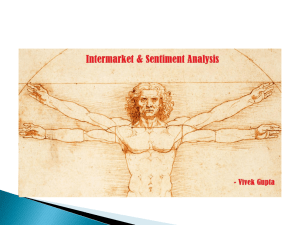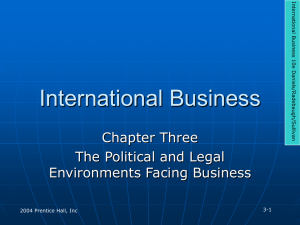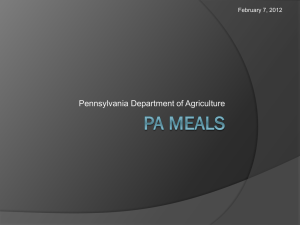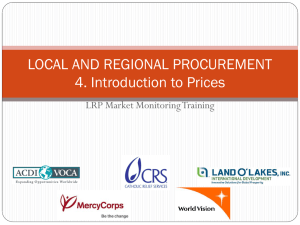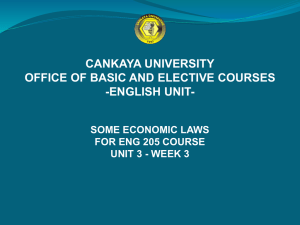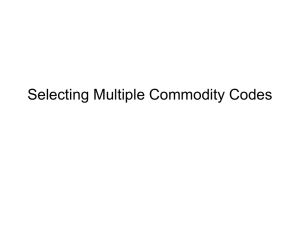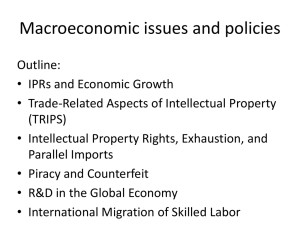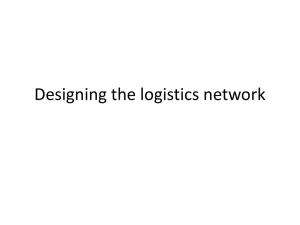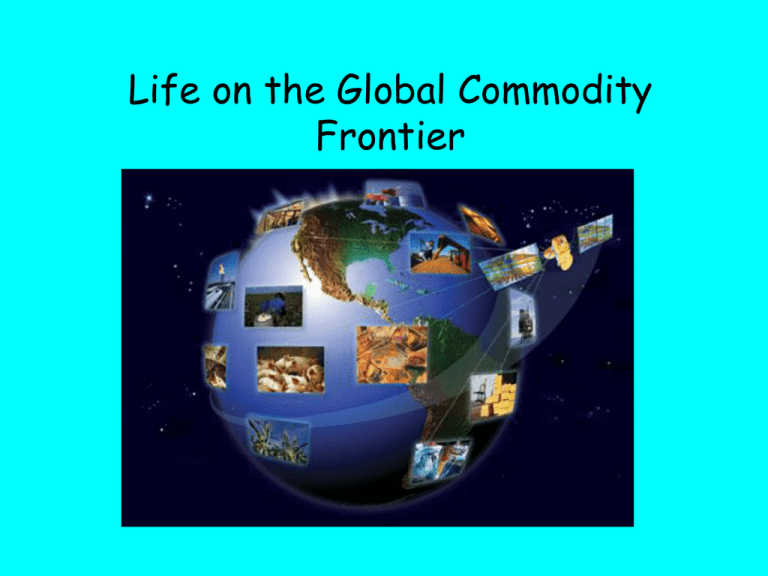
Life on the Global Commodity
Frontier
What is a commodity?
Literally, something sold in quantity
There must be a demand for it.
It must have a price in the market
Commodification involves:
Turning something into a commodity
Creating demand for a good or service
Ensuring that demand continues,
either through replacement or
upgrading
$100/bbl??
The price of
the marginal
barrel of oil is
the price of
oil everywhere
Consumer spending
is 60-70% of U.S.
economic activity
A lot of consumer
spending has been drawn
from home equity
$ 9 trillion or about $30k/person—
more than $4 trillion might be foreign
debt
Under the classical understanding of economic
accounts
•Consumers spend savings or surplus income—not equity
•Consumers stop spending when these are exhausted, or they borrow
funds in credit markets
•The government gets revenues from taxes
•If spending exceeds taxes, the government must borrow from
credit markets
•To pull funds into credit markets, interest rates must be
sufficiently high
•If interest rates are too high, they will squelch consumer spending
and other economic activity
•The economy will go into recession, employment & income will decline,
and tax revenues will go down
•How can the economy be restored?
•Through Keynesian pump-priming or
•Fiscal discipline—squeeze the economy
This pattern began to change in the 1990s
• Cheap imported goods low wage pressurelow inflation
•Dollar flows abroadChina & others buy Treasury bondsloans to government for defense
& wars
•Foreign reserve overhang unpayable IOUsdeclining dollar investment in other
currencies
•Low inflationLow interest ratesconsumer borrowingrising real estate pricesasset
inflation
•Housing bubblehigher returns than Treasury bondsMortgage bundlingselling &
speculation
•To maintain inflow of dollars requires higher interest rates; to reflate the economy
requires lower interest rates
•Oil is denominated in dollarsdeclining dollar motivates higher oil pricesmore dollars
flowing abroadfor. Reserves up
•Speculators can get higher returns betting on future oil price increases affects
price of oil today
•Attack on Iran could lead to oil shortages higher oil prices in the future
•Oil-producing countries and U.S. oil companies are benefiting from higher oil prices
•U.S. arms sales to Saudi Arabia is one way to extract some of that surplus
A commodity frontier involves:
Finding new goods for which a demand
exists or can be created
Commodifying new products for profit
If possible, establishing monopolies on
new goods through property rights
The trick is to make things with no
apparent value both scarce and costly
Create demand for new
products, e.g., MP3 players
Commodity frontier relies
on the creation of scarcity
Privatize a public resource
through enclosure, e.g.,
pollution permits
Develop new services that
people seek, e.g., medical
interventions
If you can create a monopoly, even for a limited amount of
time, you can generate windfall rents on the good or service
Some commodities last a very long
time—1968 Volvos—which tends
to limit the market for new sales
and can lead to overproduction
Hence, commodity frontiers can
involve redesign, new features,
sex appeal, all in order to get a
buyer to dump the old and buy the
new.
Planned or intentional obsolescence
is another way to maintain a
commodity frontier: new computers
run only new software which
requires prodigious quantities of
memory not available on older
models.
Information and knowledge can be
transformed into new commodities,
to be bought and sold
Consumer preferences
Software revisions
Segmented markets
DNA
Organ trade
New commodity frontiers are being
explored in knowledge, culture, and
the body
Knowledge
Software, biotech, nanotech,
consumer preferences,
personal data
Culture
Music, media, dress, food,
lifestyles, identities, living
spaces, religions, travel
Bodies
Genetic modifications, body
modification, organs, appearances, sex tourism & workers
Private property (PP) is at the heart of capitalism:
With any new product, it is important to establish proprietary rights
John Locke
Improving nature through labor
entitles one to ownership
Returns from property encourage
effort to be more productive
Milton
Friedman
Kenneth
Arrow
Only private property provides
returns required to foster individual
initiative and invention
If "information is not property, the incentives to
create it will be lacking. Patents and copyrights
are social innovations designed to create artificial
scarcities where none exist naturally... These
scarcities are intended to create the needed
incentives for acquiring information. (p. 125, in: "The
economics of information: an exposition," Empirica 23, #2 (1996):119-28.)
Intellectual property rights (IPRs) create private
property, scarcity, monopoly, and incentive—or so it is
said—which allows owners to reap “appropriate” profits
IPRs are title to forms of
knowledge that prevent
non-owners from use without payment or license
Trademarks
Patents
Copyrights
Historically, IPRs were granted nationally
One had to apply for a patent
or copyright in every country
Failure to patent meant your book
or invention could be pirated
Paris Convention of 1882
est. uniform int’l patents
Berne Convention of 1886
est. uniform copyrights
Until well into the 20th century, the
U.S. was a signatory to neither
Sometime during the 1960s and 1970s, the economic potential of
technological and biological patents became of central concern to
the U.S. government
TRIPS (Trade-Related Aspects of Intellectual
Property Rights) was a political and social
innovation by the United States to enable
corporations to assert control over products
•S/he who can establish binding rules of the global political
economy can do so to his/her advantage
•Trade-related Intellectual Property & Services (TRIPS) was the
brainchild of U.S. govt. & pharmaceutical entrepreneurs
•TRIPS sets minimum standards for protection of intellectual
property, which WTO members must follow
•WTO Dispute Resolution System as well as national courts can
enforce IPRs under the terms of TRIPS
What are the effects of IPR monopolies?
Owners of IPRs enjoy a monopoly
for a specified period of time
Others must buy a license
and pay royalties to use or
produce the good
The high costs of some innovations
are impossible for the poor to pay
Monopoly prices may make
some goods inaccessible to
the poor
New technologies remain under
control of corporations in rich
countries
Power relations are maintained via
the control of knowledge and goods
Poor countries have
access only to older
generation technologies
Open-source intellectual
goods are faced with a
restrictive environment
Global political implications of living on
the commodity frontier
• People & things come to be valued in the
market rather than for their social roles
• Since commodities have limited use value,
they tend to be discarded rather easily
• A focus on consumption foregrounds selfinterest and devalues common good
• Bonds of trust and mutual obligation are
eroded and destroyed
• This feeds back into social relations within
and among groups, and into insecurity


